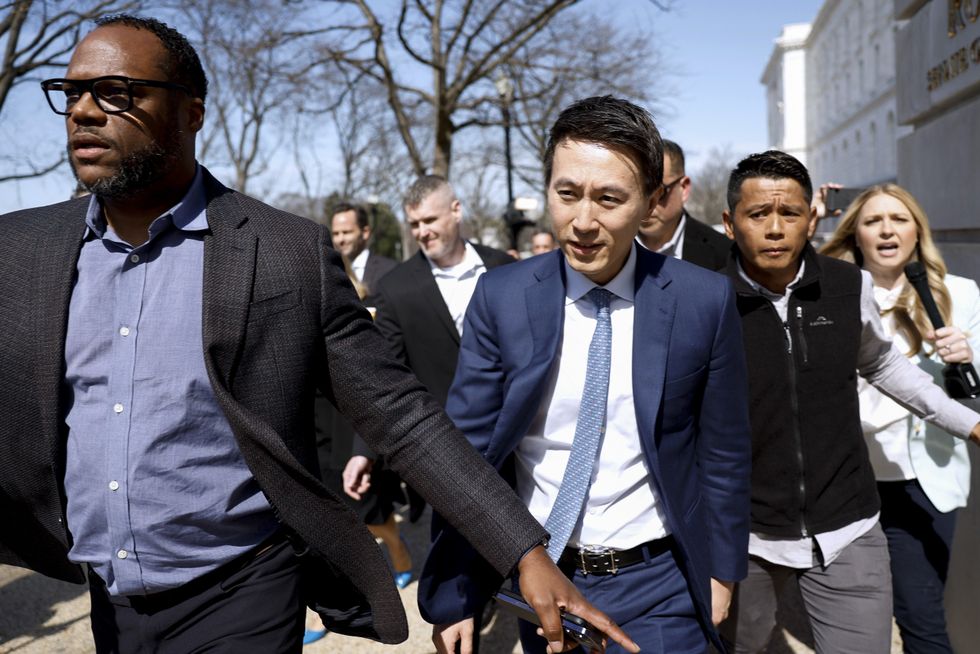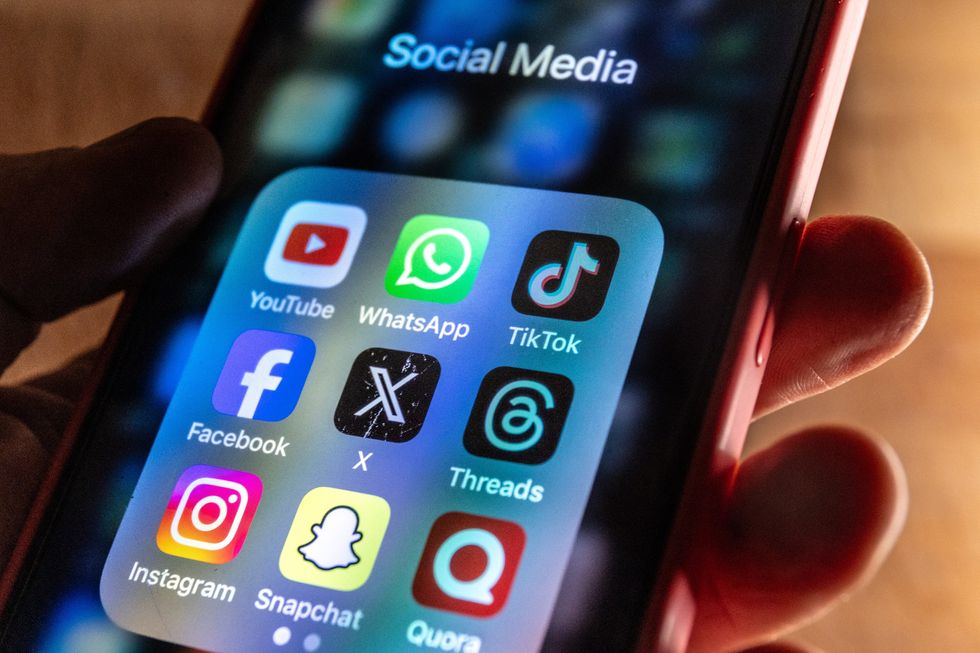March 24, 2024

Fox News Channel and radio talk show host Sean Hannity (L) interviews then-President Donald Trump before a campaign rally at the Las Vegas Convention Center on September 20, 2018 in Las Vegas, Nevada.
The U.S. House of Representatives has voted overwhelmingly to require TikTok to divest its Chinese ownership or be banned in the U.S. because of national security concerns.
The security risks identified by the bill’s sponsors include a Chinese law that gives Xi Jinping legal access to user data, along with China’s ability to meddle in U.S. elections.
The standard First Amendment debate asks: When does one person’s right to spew misinformation yield to another person’s right not to be harmed by it? In the context of elections, if Congress interferes with a foreign-owned media platform such as TikTok in the name of election security, why should a domestic corporation such as Fox News, also guilty of rampant election misinformation, be spared the same scrutiny?
Online disinformation campaigns
Over the past few years, the most aggressive online disinformation campaigns in the U.S. have targeted COVID vaccines, climate science and elections. Millions of Americans are influenced by manufactured information campaigns every day. Pew Research shows that the share of U.S. adults who want the federal government to restrict such false information has risen, from 39 percent in 2018 to 55 percent in 2023.
COVID and climate manipulation can be countered fairly easily since death rates, increasing wildfires and disappearing aquifers can’t lie.
Election misinformation is another story. Of all the disinformation campaigns online at any given hour, election lies are the most difficult to regulate because political speech is afforded the highest legal protection under the 1st Amendment.
Paradoxically, political disinformation presents the greatest threat to the 1st Amendment, as politicians in a position to curb it sometimes become top disinformation purveyors.
Consider that Donald Trump started claiming the 2020 election was rigged months before the first votes were cast. Since then, an initially resistant GOP has begun to see the political expediency in parroting his claims: Republicans have not won the popular vote in a presidential election in decades, and it’s easier to falsely decry “stolen election” than to adjust policies enough to widen their political appeal.
The GOP’s strained relationship with the truth is further complicated by deep-pocket political donors who demand outcomes different from what ordinary voters want — and are willing to finance massive public disinformation campaigns to achieve those outcomes.
As a direct result of widespread election disinformation, 40 percent of Americans still think Trump won the 2020 election, and 64 percent of election officials say their jobs are now more dangerous. Not only does election misinformation weaken domestic political processes, it has been weaponized by lawmakers on the right to justify new voter suppression laws in a self-serving, closed-loop information feed.
Why should Fox ‘News’ be spared?
TikTok may downplay its interest in U.S. domestic politics. But when it encouraged users to flood U.S. representatives’ offices with angry calls, TikTok parent company ByteDance demonstrated both its interest and its ability to influence American political outcomes when it wants to.
Its lobbying force in Washington, D.C., is formidable and growing, and even includes a former professional football player.

Shou Zi Chew, CEO of TikTok, departs from the Russell Senate Office Building after meeting with Sen. John Fetterman (D-PA) on March 14, 2024, in Washington, D.C. The House of Representatives voted to ban TikTok in the United States unless the Chinese-owned parent company ByteDance sells the popular video app within the next six months.
It’s also evident that TikTok’s algorithms suppress themes that aggravate Chinese leaders. As reported by the New York Times, researchers compiled information about popular TikTok videos on topics commonly suppressed inside China, such as the fate of China’s Uyghur population and public protests in Hong Kong. They found that these topics were underrepresented on TikTok compared to other social networks, including Instagram. The research emerged from TikTok’s own “Creative Center,” and after the under-representation was reported, TikTok quietly reigned in its own research tool rather than address the subterfuge.
As Congress grapples with such foreign data manipulation, why should domestic manipulation by Fox News be treated differently? Fox News admitted to peddling massive voter disinformation during the last presidential election, and it appears they are at it again.
Fox News admitted lying about Trump’s 2020 loss
Dominion introduced explosive documentary evidence that key Fox anchors and executives told each other that Trump’s buffoonish stolen election claims were a joke, but told their viewers something quite different.
Fox luminaries texted, emailed or commented to each other that Trump’s stolen election lies and the fraudsters supporting them were “Ludicrous” and “totally off the rails”(Tucker Carlson); “F—g lunatics” (Sean Hannity); “Nuts” (Dana Perino); “Complete BS” (Fox Producer John Fawcett); “Kooky” (anchor Maria Bartiromo); “Mind Blowingly Nuts” (Raj Shah, Fox Corporation VP); and, “There is NO evidence of fraud. None” (Bret Baier).
And yet, these same luminaries continued to promote Trump’s stolen election lies on-air, just to attract low-information viewers.
Carlson didn’t tell Fox viewers that Trump was “off the rails.” Instead, he donned his trademark injured puppy face, poured his hurt eyes into the camera, and cried, “The stolen election was the single greatest crime in American history with millions of votes stolen in a day. Democracy destroyed. The end of our centuries old system of government.”
Fox viewers, believing their votes and democracy itself were stolen, were understandably triggered.
Election threats within
Trump and Fox News continued to goad MAGA voters into believing their votes were “stolen” until they violently attacked the U.S. Capitol on Jan. 6, 2021.
The insurrection, during which multiple people lost their lives, was the direct result of election misinformation, leaving Fox News with at least some culpability for the attack.
And yet, even as Congress expresses deep concern over TikTok’s potential for election interference, there has been no discussion about Fox News. The TikTok bill’s lead sponsor, Mike Gallagher (R-WI) told NPR that that the TikTok app had been used to interfere in elections.
ALSO READ: A criminologist explains why half of America does not care about Trump's crimes
Post-2020, there is no serious question about whether Fox also interferes in elections or plans to interfere with them again, as Trump and President Joe Biden speed toward a rematch in November.
TikTok has more reach than Fox, as nearly half of America’s population uses TikTok. Fox News, for its part, is the top-rated cable network, averaging 1.85 million viewers daily during primetime hours. Fox & Friends has been the most viewed cable-news morning show for 22 years.
As instruments of social and political manipulation, TikTok and Fox News target similar audiences. TikTok attracts hormonal teens with addictive, homegrown videos, while Fox targets their low-education parents and grandparents. Both outlets manipulate their audience by selling infotainment as news.

In this photo illustration, A man holds a smartphone iPhone screen showing various social media apps including YouTube, TikTok, Facebook, Threads, Instagram and X on March 13, 2024. (Photo by Anna Barclay/Getty Images)
If the TikTok bill makes it through the U.S. Senate, it will face a stiff legal challenge. Under long-established 1st Amendment precedent, the government will need to show a compelling government interest, and that forced divestment — or a ban — represents the least restrictive means of advancing that interest.
Under any legal analysis, there are few concerns more compelling to the U.S. federal government than preserving free elections and the democratic system. What’s glaringly missing from the debate about online disinformation, at least so far, is why election interference from TikTok is any more dangerous than election interference from Fox News.
Sabrina Haake is a columnist and 25 year litigator specializing in 1st and 14th Amendment defense. Follow her on Substack.













